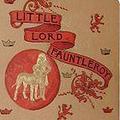Chapter 2 (5)
He had another slight shock when Mrs. Errol asked Mary to find her little boy and bring him to her, and Mary told her where he was.
"Sure I'll foind him aisy enough, ma'am," she said; "for it's wid Mr. Hobbs he is this minnit, settin' on his high shtool by the counther an' talkin' pollytics, most loikely, or enj'yin' hisself among the soap an' candles an' pertaties, as sinsible an' shwate as ye plase." "Mr. Hobbs has known him all his life," Mrs. Errol said to the lawyer. "He is very kind to Ceddie, and there is a great friendship between them." Remembering the glimpse he had caught of the store as he passed it, and having a recollection of the barrels of potatoes and apples and the various odds and ends, Mr. Havisham felt his doubts arise again. In England, gentlemen's sons did not make friends of grocerymen, and it seemed to him a rather singular proceeding. It would be very awkward if the child had bad manners and a disposition to like low company. One of the bitterest humiliations of the old Earl's life had been that his two elder sons had been fond of low company. Could it be, he thought, that this boy shared their bad qualities instead of his father's good qualities? He was thinking uneasily about this as he talked to Mrs. Errol until the child came into the room. When the door opened, he actually hesitated a moment before looking at Cedric. It would, perhaps, have seemed very queer to a great many people who knew him, if they could have known the curious sensations that passed through Mr. Havisham when he looked down at the boy, who ran into his mother's arms. He experienced a revulsion of feeling which was quite exciting. He recognized in an instant that here was one of the finest and handsomest little fellows he had ever seen.
His beauty was something unusual. He had a strong, lithe, graceful little body and a manly little face; he held his childish head up, and carried himself with a brave air; he was so like his father that it was really startling; he had his father's golden hair and his mother's brown eyes, but there was nothing sorrowful or timid in them. They were innocently fearless eyes; he looked as if he had never feared or doubted anything in his life.
"He is the best-bred-looking and handsomest little fellow I ever saw," was what Mr. Havisham thought. What he said aloud was simply, "And so this is little Lord Fauntleroy." And, after this, the more he saw of little Lord Fauntleroy, the more of a surprise he found him. He knew very little about children, though he had seen plenty of them in England--fine, handsome, rosy girls and boys, who were strictly taken care of by their tutors and governesses, and who were sometimes shy, and sometimes a trifle boisterous, but never very interesting to a ceremonious, rigid old lawyer. Perhaps his personal interest in little Lord Fauntleroy's fortunes made him notice Ceddie more than he had noticed other children; but, however that was, he certainly found himself noticing him a great deal. Cedric did not know he was being observed, and he only behaved himself in his ordinary manner. He shook hands with Mr. Havisham in his friendly way when they were introduced to each other, and he answered all his questions with the unhesitating readiness with which he answered Mr. Hobbs. He was neither shy nor bold, and when Mr. Havisham was talking to his mother, the lawyer noticed that he listened to the conversation with as much interest as if he had been quite grown up.
"He seems to be a very mature little fellow," Mr. Havisham said to the mother. "I think he is, in some things," she answered. "He has always been very quick to learn, and he has lived a great deal with grownup people. He has a funny little habit of using long words and expressions he has read in books, or has heard others use, but he is very fond of childish play. I think he is rather clever, but he is a very boyish little boy, sometimes." The next time Mr. Havisham met him, he saw that this last was quite true. As his coupe turned the corner, he caught sight of a group of small boys, who were evidently much excited. Two of them were about to run a race, and one of them was his young lordship, and he was shouting and making as much noise as the noisiest of his companions. He stood side by side with another boy, one little red leg advanced a step.
"One, to make ready!" yelled the starter. "Two, to be steady. Three--and away!"

